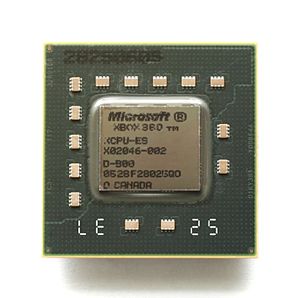Xenon (CPU): Difference between revisions
Jump to navigation
Jump to search
No edit summary |
imported>Tuxuser m (Text replace - "Category:Hardware" to "Category:Xbox360_Hardware") |
||
| Line 49: | Line 49: | ||
*[http://www.ccw.com.cn/notebook/pczx/sy/htm2005/20051028_16OMI.htm CPU Chip for Xbox 360 Manufacturing Overview, FSB, PPC Core, VMX & FPU, & L2 Cache block diagrams] from IBM | *[http://www.ccw.com.cn/notebook/pczx/sy/htm2005/20051028_16OMI.htm CPU Chip for Xbox 360 Manufacturing Overview, FSB, PPC Core, VMX & FPU, & L2 Cache block diagrams] from IBM | ||
[[Category: | [[Category:Xbox360_Hardware]] | ||
Latest revision as of 00:24, 7 January 2014
Xenon is the CPU that is used in the Xbox 360.
The processor, internally codenamed Waternoose by IBM and XCPU by Microsoft. "The basic design is a 64-bit PowerPC architecture, with the complete PowerPC ISA available."
It is different from the Intel Pentium III in the original Xbox: the Xenon CPU is composed of three symmetrical cores on a single die, each core has two symmetric hardware threads (SMT), for a total of six hardware threads available to games. Each individual core also includes 32 KiB of L1 instruction cache and 32 KiB of L1 data cache.
Specifications
- The package is a 2-2-2 FC-PBGA, measuring 31mm by 31mm
- 168 mm2 die size; one cpu core is about 28mm2
- Support logic for Array and Logic Built in Selftest
- 165 Million transistors
- Three symmetrical cores running at 3.2 GHz each = 9.6Ghz throughput.
- 32 KiB of L1 instruction cache and 32 KiB of L1 data cache per core
- 64 bit CPU cores based on the IBM 970 "G5" design
- Each core is two way SMT-capable and clocked at 3.2Ghz
- 2× (128×128 bit) register files for each core
- Two hardware threads per core; six hardware threads total
- VMX-128 vector unit per core; three total
- 128 VMX-128 registers per hardware thread
- 1 MB L2 cache
- (lockable by the GPU) running at half-speed (1.6 GHz) with a 256-bit bus
- 51.2 gigabytes per second of L2 memory bandwidth (256 bit × 1600 MHz)
- 21.6 GB/s front side bus (aggregated 10.8 GB/s upstream and downstream)
- 115 GFLOPS theoretical peak performance
- CPU Integer Perf (VPR): 1089 (363 each)
- Dot product performance: 9.6 billion per second
- IBM eFuse technology
- IBM's PowerPC instruction set architecture
- Restricted to In-order code execution
- Big endian architecture
Linux Support
- We have full SMP support, so we can use all three cores.
- However, we currently need to disable the secondary threads because of a yet-to-be analyzed stability issue.
- The CPU is quite slow on general purpose code. Due to the non out-of-order execution core, it heavily relies on the compiler to do proper optimizations. GCC currently doesn't know how to do this, resulting in running but very inefficient code.
- The Cell people worked on PPU-GCC, from which the Xenon will benefit as well, as the PPC cores is quite similiar to the Cell's PPU. All PPU-GCC work have been merged on mainline GCC 4.4
External Links
- Application-customized CPU design: The Microsoft Xbox 360 CPU story Jeffrey Brown, Distinguished Engineer, IBM
- "Power" Architecture Technology at IBM
- SoC drawer: The resource view at IBM (mentions Xbox CPU design. Gets nitty gritty on resources and scheduling, i/o interconnects, & on chip memory)
- Just like being there: Papers from the Fall Processor Forum 2005: Application-customized CPU design at IBM (Explore the customized IBM PowerPC processor designed for the Microsoft XBox 360)
- Xenon hardware overview by Pete Isensee, Development Lead, Xbox Advanced Technology Group, written some time before 23 June 2004
- Ars Technica explains the Xenon CPU
- Xbox360 CPU at Wikipedia
- PowerPC 970 at Wikipedia
- PowerPC at Wikipedia
- POWER4 at Wikipedia
- CPU Chip for Xbox 360 Manufacturing Overview, FSB, PPC Core, VMX & FPU, & L2 Cache block diagrams from IBM
